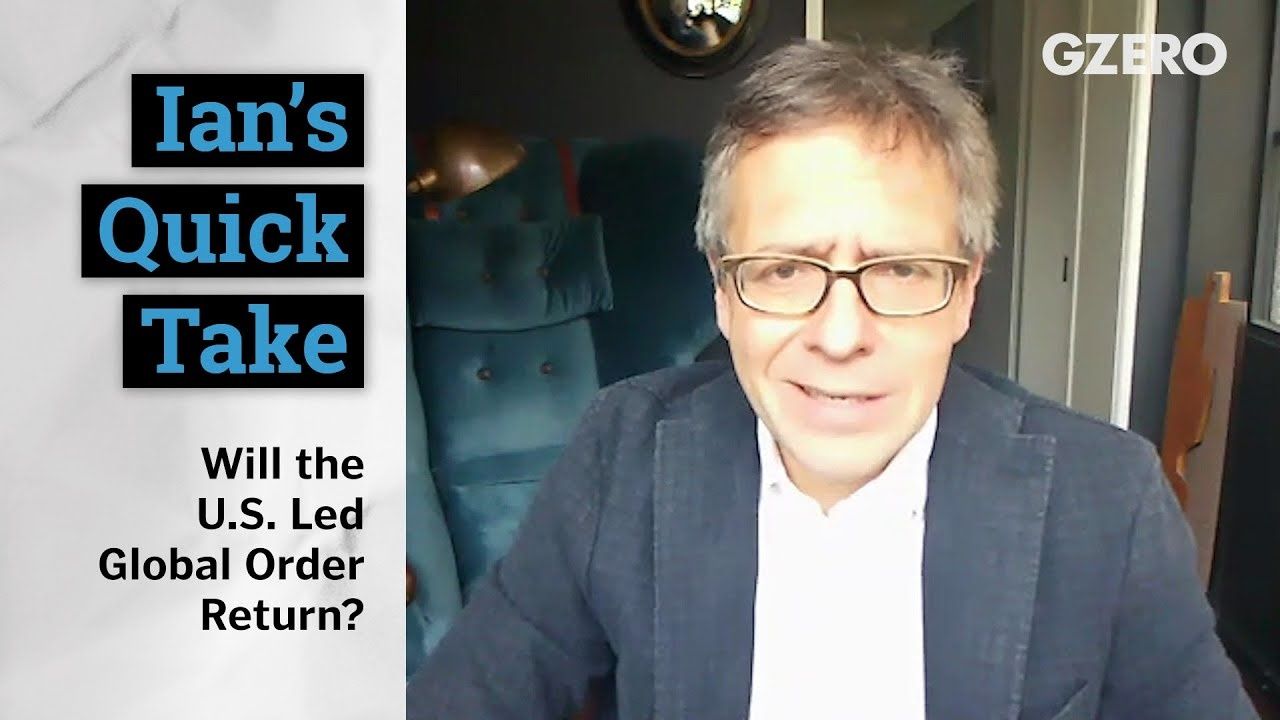Science & Tech
Ian Bremmer: Global leadership power shift

Ian Bremmer: Global Leadership Power Shift | Future of Alliances & Intl Collaboration | GZERO Media

The old US led order is gone. It relied on alignment around the world.
The UK has left the European Union. The EU faces existential questions on whether the Union will be in place in 3 years, given extraordinary need for redistribution - how that can function in the worst economic crisis in our lifetimes? Euro skeptic; anti-establishment sentiment across Europe - feel more like individual states, less like a coordinated union, weakens the trans-Atlantic relationship.
Russia in decline, even before oil prices went negative. Russia's badly managed economy is smaller than Canada. Putin's popularity diminishing, handling coronavirus badly. He blames the United States. Some was mismanagement and kleptocracy in Russia. Some is the US not helping the Russians after the Soviet Union collapse; expanding NATO up to their borders and the Europeans expanding the EU.
Energy, pipeline diplomacy from the US, to get the Caspian and the Caucasus away from Russia, benefit American companies. What about Russia? They're angry, working to undermine the transatlantic relationship, democracy in the US. Their interventions playing on American divisions, Europe. That continues, with weaker institutions, more people angry believing institutions are rigged.
China: Mistaken assumption by the West that, as China becomes wealthier, they integrate into Western institutions, "responsible stakeholdership". From China's perspective, that was American exceptionalism. "You want us to act like a rich country, even though we're not, want us to play by the rules of the institutions that you created, even though we're authoritarian and state capitalist, why would we do that?" Instead, you see Xi Jinping consolidating power. Feeling more vulnerable internationally and domestically; strengthening state capitalism, strategic control, alignment of key industries with the Chinese government. Building international architecture that competes with the West. The Asian Infrastructure Investment Bank, the Chinese Development Bank, One Belt One Road.
Alignment with a US led global order has structurally changed, has been incrementally over decades; it's speeding up. Trump presidency exacerbated it; it was coming anyway. The economic hit exacerbates divisions, undermines belief in the authority and example that the American exceptionalism had historically benefited from - even less likely that the United States could return to it.
Biden is an internationalist, would want the US to return to the Paris climate accord, supports a consolidated Europe, even though Europe is falling apart and there's more anti-European sentiment. United States support is eroding.
One, domestic opposition to being the world's policeman or architect of global trade - policies have not benefited many Americans. After wars in Vietnam, Afghanistan, Iraq on the back of poor, disenfranchised Americans. Why support more policies like that? Why support more free trade? The top 10% has done well, the top 0.1% has done incredibly well? The average American since '76 got squat. 15% unemployment, could be 20% in the next month. Support for US internationalism, I don't think you see it.
NATO is not aligned towards dealing with China, but China is the principal concern. Would the US support NATO as much as 10, 20, 30 years ago? Not really. The Middle East? When Americans needed oil from the Middle East, real issue. How much support for Saudis and Gulf states when the US is the largest producer in the world? Do Americans want to be more cooperative, spend more money, send more troops?
Technology firms are big winners. That's how the economy's working right now. Those companies are overwhelmingly American.
I love what the Statue of Liberty stands for. But if we increasingly don't need labor in the United States, automating, have 15% unemployment, don't support immigration as much. American interest in leading a multilateral global order is down, irrespective of who we vote for.
A different global order where the Americans remain most powerful, but the nature of the institutions, participation, values, standards have to be more collaborative, cooperative. We have to build them quickly, because the challenges - also climate change and others, are deeply global. So, the response has to be more than just American, too.
Is China’s economic model reaching a breaking point? In GZERO’s 2026 Top Risks livestream, Cliff Kupchan, Chairman of Global Macro at Eurasia Group, highlights mounting pressures on the Chinese economy.
2026 is a tipping point year. The biggest source of global instability won’t be China, Russia, Iran, or the ~60 conflicts burning across the planet – the most since World War II. It will be the United States.
While surgeons remain fully in control, technological advances are expanding the use of surgical robots in operating rooms. As adoption accelerates, so do the expectations for patient outcomes and surgical care. Track medical innovation trends with Bank of America Institute.
Europe enters 2026 under mounting strain as it confronts external threats, internal political pressures, and a weakening relationship with the United States. In GZERO’s 2026 Top Risks livestream, Mujtaba Rahman, Managing Director for Europe at Eurasia Group, describes a continent that is “exhausted, fatigued, weak, and vulnerable.”